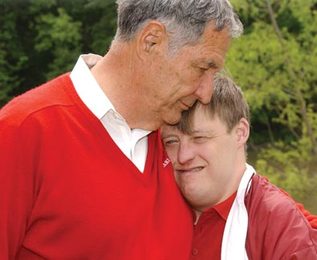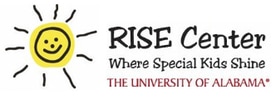The RISE Program is a nationally recognized early childhood education program that is dedicated to excellence in service, research, and teaching. The program predominately serves young children with varying abilities, but also includes traditional learners. The RISE model is a unique blend of early childhood education, child development, early childhood special education, and integrated therapy. The purpose of the program is to optimally prepare children for their next educational environment, and to provide support to families. RISE is a part of the College of Human Environmental Studies at The University of Alabama in Tuscaloosa Alabama.
MISSION OF RISE
- Provide exemplary services based on recommended practices for young children with diverse abilities and their families
- Offer instructional opportunities through collaboration with various academic units in higher education
- Engage in research that positively influences practices in the field of early childhood education at the local, state, and national levels
- Interface with the community through outreach activities
- Disseminate information and provide technical assistance to other community-based agencies
- Affect policy and system changes at the local, state, and national levels
COACH STALLINGS

In 1990, Gene Stallings became the head football coach at The University of Alabama and immediately became an advocate for the RISE program. His son, Johnny, was born with Down syndrome in 1962 in Tuscaloosa. Stallings was an assistant football coach at Alabama for the legendary Bear Bryant at that time. Having little of no support when Johnny was born, Coach Stallings and his wife Ruth Ann appreciated the availability of services provided to families by the RISE program when he returned to Alabama in 1990.
In 1992, The University of Alabama initiated a capital campaign to build a new facility for the RISE program. As the campaign began, Coach Stallings led the football program to the national championship and received the Bryant trophy as the National Coach of the Year. Shortly afterwards, the RISE program met its capital campaign goal and the new home of RISE, The Stallings Center, opened on November 20, 1994. The program expanded to include six classrooms and served over 80 children. In this state-of- the-art facility, the staff size increased to 34 individuals. The Stallings’ family support, friendship and dedication to the RISE program continues to contribute to the program’s success and longevity.
In 1992, The University of Alabama initiated a capital campaign to build a new facility for the RISE program. As the campaign began, Coach Stallings led the football program to the national championship and received the Bryant trophy as the National Coach of the Year. Shortly afterwards, the RISE program met its capital campaign goal and the new home of RISE, The Stallings Center, opened on November 20, 1994. The program expanded to include six classrooms and served over 80 children. In this state-of- the-art facility, the staff size increased to 34 individuals. The Stallings’ family support, friendship and dedication to the RISE program continues to contribute to the program’s success and longevity.
OUR MISSION
The purpose of the RISE Program is to support the mission of The University of Alabama which is to provide research, training, and service. This mission of the Rise Program includes:1. Providing exemplary services based on recommended practices to young children with diverse abilities and their families.
Interfacing with the community through outreach activities.
2. Offering instructional opportunities through collaboration with various academic units within The University of Alabama system and with other colleges and universities.
3. Engaging in research that positively influences practice in the field of early childhood education at the local, state, and national levels.
4. Disseminating information and providing technical assistance to other community-based agencies; and effecting policy and systems change at the local, state, and national levels.
Interfacing with the community through outreach activities.
2. Offering instructional opportunities through collaboration with various academic units within The University of Alabama system and with other colleges and universities.
3. Engaging in research that positively influences practice in the field of early childhood education at the local, state, and national levels.
4. Disseminating information and providing technical assistance to other community-based agencies; and effecting policy and systems change at the local, state, and national levels.
OUR VALUES
1. Family-centered services designed to meet the individualized needs of all children and families
2. The blending of educational and therapy services within the context of a developmentally appropriate curriculum
3. Preparing young children for their next educational environment.
2. The blending of educational and therapy services within the context of a developmentally appropriate curriculum
3. Preparing young children for their next educational environment.
OUR PHILOSOPHY
The program adheres to the philosophy and recommended practices of both early childhood special education and general early childhood education. The philosophy is based on the following premises:
1. Services are family-centered with particular emphasis placed on the family as the primary decision-maker in each child’s program.
2. The assessment process is dynamic and ongoing and includes multiple procedures, information sources, and settings. Assessment is linked to instruction.
3. Services are designed around an individualized plan consisting of goals and outcomes based on family’s concerns, priorities, and resources; the child’s strengths and needs; and expectations of the next environment.
4. Services are offered, varying in intensity and structure, based on the individual and group needs of children and families.
5. Children’s development is promoted in all areas including gross and fine motor skills, independence, cognitive skills, social competence and emotional growth, and communication.
6. Therapy services (i.e., physical therapy, occupational therapy, speech therapy, and music therapy) are provided within the context of the educational environment using an integrated approach. Therapy goals are educationally relevant and are implemented collaboratively by the therapists and teaching staff.
7. The foundation of the learning environment and activities is based on general early childhood education guidelines, which are blended with recommended practices from early childhood special education.
8. Specially designed instruction and curricular adaptations and accommodations are embedded in the daily activities of the classroom.
9. The curricula are aligned with the mission to apply child development principles to children with diverse abilities and address all of the content areas required by the state standards that include gross motor, fine motor, social, cognitive, adaptive, science, math and social studies.
10. The purpose of RISE is to provide a full spectrum of meaningful learning activities that adapted for children with special needs. This requires the careful selection of curricula that meets this criteria.
11. The curriculum includes functional objectives that support children in their current environment and prepare them for more inclusive environments.
12. The curriculum reflects a balance between child-initiated and teacher-supported activities.
13. The program addresses the children’s transitions from one classroom to another and transitions to other more inclusive educational environment.
1. Services are family-centered with particular emphasis placed on the family as the primary decision-maker in each child’s program.
2. The assessment process is dynamic and ongoing and includes multiple procedures, information sources, and settings. Assessment is linked to instruction.
3. Services are designed around an individualized plan consisting of goals and outcomes based on family’s concerns, priorities, and resources; the child’s strengths and needs; and expectations of the next environment.
4. Services are offered, varying in intensity and structure, based on the individual and group needs of children and families.
5. Children’s development is promoted in all areas including gross and fine motor skills, independence, cognitive skills, social competence and emotional growth, and communication.
6. Therapy services (i.e., physical therapy, occupational therapy, speech therapy, and music therapy) are provided within the context of the educational environment using an integrated approach. Therapy goals are educationally relevant and are implemented collaboratively by the therapists and teaching staff.
7. The foundation of the learning environment and activities is based on general early childhood education guidelines, which are blended with recommended practices from early childhood special education.
8. Specially designed instruction and curricular adaptations and accommodations are embedded in the daily activities of the classroom.
9. The curricula are aligned with the mission to apply child development principles to children with diverse abilities and address all of the content areas required by the state standards that include gross motor, fine motor, social, cognitive, adaptive, science, math and social studies.
10. The purpose of RISE is to provide a full spectrum of meaningful learning activities that adapted for children with special needs. This requires the careful selection of curricula that meets this criteria.
11. The curriculum includes functional objectives that support children in their current environment and prepare them for more inclusive environments.
12. The curriculum reflects a balance between child-initiated and teacher-supported activities.
13. The program addresses the children’s transitions from one classroom to another and transitions to other more inclusive educational environment.
CONTACT:
RISE Center, The University of Alabama, 600 Johnny Stallings Drive Tuscaloosa, AL 35401 | PO Box 870305, Tuscaloosa, AL 35487
Andi Gillen - RISE Center Director, Phone 205-348-7931 or Email [email protected]
Andi Gillen - RISE Center Director, Phone 205-348-7931 or Email [email protected]
|
VOLUNTEER
|
UA COMMUNITY
|
SUPPORT & INFO
|
Accessibility |Disclaimer I Privacy I Contact
The University of Alabama I Tuscaloosa, AL 35487 © COPYRIGHT 2017. ALL RIGHTS RESERVED. |



